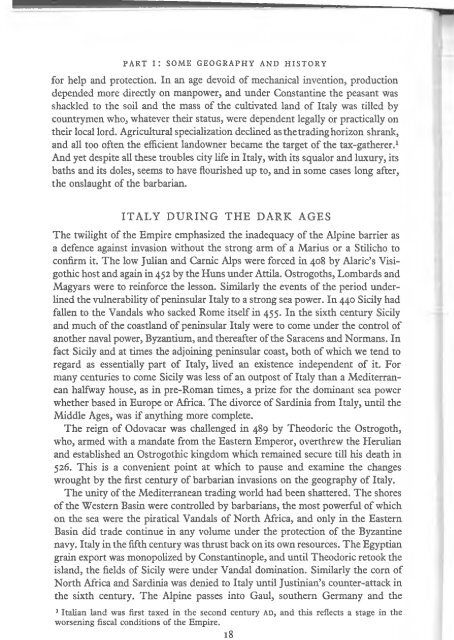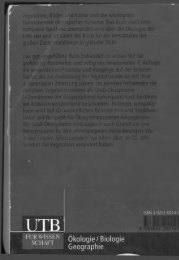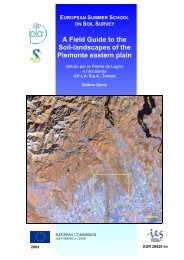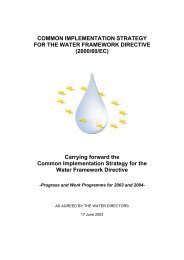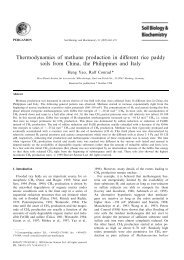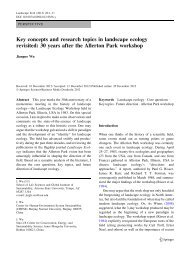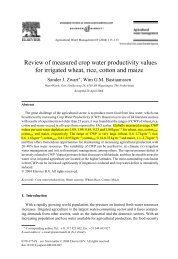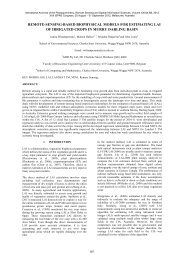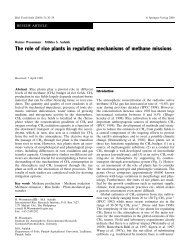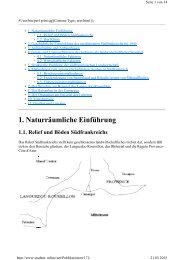Walker - 1967 - A geography of Italy
Walker - 1967 - A geography of Italy
Walker - 1967 - A geography of Italy
Create successful ePaper yourself
Turn your PDF publications into a flip-book with our unique Google optimized e-Paper software.
* Italian land was first taxed in the second century AD, and this reflects a stage in the<br />
worsening fiscal conditions <strong>of</strong> the Empire.<br />
18<br />
PART l; SOME GEOGRAPHY AND HISTORY<br />
for help and protection. In an age devoid o f mechanical invention, production<br />
depended more directly on manpower, and under Constantine the peasant was<br />
shackled to the soil and the mass <strong>of</strong> the cultivated land o f <strong>Italy</strong> was tilled by<br />
countrymen who, whatever their status, were dependent legally or practically on<br />
their local lord. Agricultural specialization declined as the trading horizon shrank,<br />
and all too <strong>of</strong>ten the eificient landowner became the target o f the tax-gatherer.^<br />
And yet despite all these troubles city life in <strong>Italy</strong>, with its squalor and luxury, its<br />
baths and its doles, seems to have flourished up to, and in some cases long after,<br />
the onslaught o f the barbarian.<br />
IT A L Y D U R IN G TH E D A R K AGES<br />
The twilight o f the Empire emphasized the inadequacy o f the Alpine barrier as<br />
a defence against invasion without the strong arm o f a Marius or a Stilicho to<br />
confirm it. The low Julian and Carnic Alps were forced in 408 by Alaric’s Visigothic<br />
host and again in 452 by the Huns under Attila. Ostrogoths, Lombards and<br />
Magyars were to reinforce the lesson. Similarly the events o f the period underlined<br />
the vulnerability o f peninsular <strong>Italy</strong> to a strong sea power. In 440 Sicily had<br />
fallen to the Vandals who sacked Rome itself in 455. In the sixth century Sicily<br />
and much o f the coastland o f peninsular <strong>Italy</strong> were to come under the control <strong>of</strong><br />
another naval power, Byzantium, and thereafter o f the Saracens and Normans. In<br />
fact Sicily and at times the adjoining peninsular coast, both o f which we tend to<br />
regard as essentially part o f <strong>Italy</strong>, hved an existence independent o f it. For<br />
many centuries to come Sicily was less o f an outpost o f <strong>Italy</strong> than a Mediterranean<br />
halfway house, as in pre-Roman times, a prize for the dominant sea power<br />
whether based in Europe or Africa. The divorce o f Sardinia from <strong>Italy</strong>, until the<br />
Middle Ages, was if anything more complete.<br />
T h e reign <strong>of</strong> Odovacar was challenged in 489 by Theodoric the Ostrogoth,<br />
who, armed with a mandate from the Eastern Emperor, overthrew the Herulian<br />
and established an Ostrogothic kingdom which remained secure till his death in<br />
526. This is a convenient point at which to pause and examine the changes<br />
wrought by the first century o f barbarian invasions on the <strong>geography</strong> o f <strong>Italy</strong>.<br />
The unity o f the Mediterranean trading world had been shattered. The shores<br />
o f the Western Basin were controlled by barbarians, the most powerful o f which<br />
on the sea were the piratical Vandals o f North Africa, and only in the Eastern<br />
Basin did trade continue in any volume under the protection o f the Byzantine<br />
navy. <strong>Italy</strong> in the fifth century was thrust back on its own resources. The Egyptian<br />
grain export was monopolized by Constantinople, and until Theodoric retook the<br />
island, the fields o f Sicily were under Vandal domination. Similarly the corn o f<br />
North Africa and Sardinia was denied to <strong>Italy</strong> until Justinian’s counter-attack in<br />
the sixth century. The Alpine passes into Gaul, southern Germany and the


